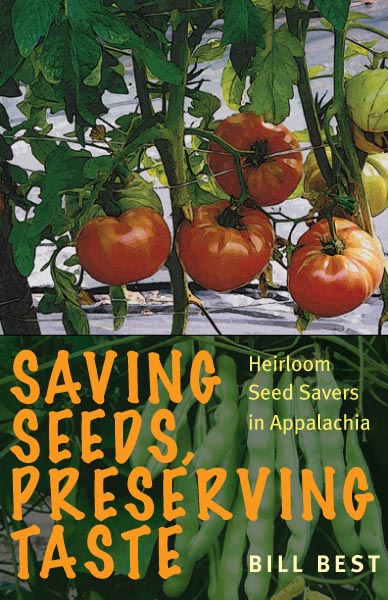 Saving Seeds, Preserving Taste Saving Seeds, Preserving Taste
Heirloom Seed Savers in Appalachia
Bill Best
Narrated by Pete Ferrand
Available from Audible
Book published by Ohio University Press
The Brown Goose, the White Case Knife, Ora’s Speckled Bean, Radiator Charlie’s Mortgage Lifter — these are just a few of the heirloom fruits and vegetables you’ll encounter in Bill Best’s remarkable history of seed saving and the people who preserve both unique flavors and the Appalachian culture associated with them. As one of the people at the forefront of seed saving and trading for over fifty years, Best has helped preserve numerous varieties of beans, tomatoes, corn, squashes, and other fruits and vegetables, along with the family stories and experiences that are a fundamental part of this world. While corporate agriculture privileges a few flavorless but hardy varieties of daily vegetables, seed savers have worked tirelessly to preserve genetic diversity and the flavors rooted in the Southern Appalachian Mountains — referred to by plant scientists as one of the vegetative wonders of the world.
Saving Seeds, Preserving Taste will introduce readers to the cultural traditions associated with seed saving, as well as the remarkable people who have used grafting practices and hand-by-hand trading to keep alive varieties that would otherwise have been lost. As local efforts to preserve heirloom seeds have become part of a growing national food movement, Appalachian seed savers play a crucial role in providing alternatives to large-scale agriculture and corporate food culture. Part flavor guide, part people’s history, Saving Seeds, Preserving Taste will introduce you to a world you’ve never known — or perhaps remind you of one you remember well from your childhood.
Bill Best was a professor, coach, and administrator at Berea College for forty years, retiring in 2002. Since that time he has continued his seed saving and work with sustainable agriculture and for several years has been director of the Sustainable Mountain Agriculture Center located near Berea, Kentucky. The center makes heirloom seeds available to a wide regional audience and to the nation in general. In addition, through special arrangements, the center also ships seeds to many other countries.
REVIEWS:
“Saving Seeds, Preserving Taste is a practical and useful handbook for good garden husbandry but as it unfolds before your eyes, it reveals as well a vital world of southern Appalachian people, plants, food, and practice to nourish both body and soul.”
—Appalachian Heritage “Saving Seeds, Preserving Taste is a fascinating read. If you have never saved seeds yourself this book will make you want to do so.”
—Home Greenhouse magazine “If you're interested in history and enjoy reading first-person accounts, this is a wonderful treasure. Bill has taken the legacy of these wonderful seed-savers one step further than the seeds. He's collected the stories and biographies into this great little book to preserve the ‘how and why' behind some of our beloved seeds and plants. In the past, oral tradition was good enough for the family of ‘Aunt Bessie' when they saved her seeds, but with the growing interest in heirlooms, getting it down in print makes sure that gardeners world-wide have access to the record.”
—Dave‚Äôs Garden “With a resurgence of interest in homegrown heirlooms, Saving Seeds, Preserving Taste offers new gardeners a peek into what they've been missing, and a few hints about how to connect with cultivating the incredible diversity of edible treasures that are available…. New gardeners looking for guidance and knowledgeable gardeners wanting to try a few new heirloom varieties will benefit from Best's years of experience.”
—Lexington Herald Leader “This is a worthy read for everyone—whether they're lifelong lovers of heirloom varieties or have just started on the road to growing their own flavor-packed tomatoes.”
—Edible Columbus “Perhaps only once in a lifetime, we read a book that is a true treasure of American lore, one that no other person could write. Bill Best should be considered a National Treasure Keeper, for his beans, tomatoes, and corn — as well as his stories — are irreplaceable and therefore of immeasurable value.”
—Gary Nabhan, author of Coming Home to Eat: The Pleasures and Politics of Local Foods
|

